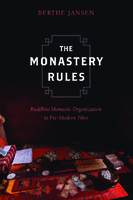The Monastery Rules
Buddhist Monastic Organization in Pre-Modern Tibet
Author(s)
Jansen, Berthe
Collection
Dutch Research Council (NWO); Knowledge Unlatched (KU)Language
EnglishAbstract
"The Monastery Rules discusses the position of monks and monasteries in pre-1950s Tibetan Buddhist societies. Using the monastic guidelines (bca’ yig) as primary sources, this book examines the impact of Buddhist monastic institutions on Tibetan societies by looking at their monastic policies that deal with organization, economy, justice, and public relations. As this type of literature has not been studied in any detail, this is also an exploration of this genre, its parallels in other Buddhist cultures, its connection to the Vinaya, and its value as socio-historical source-material. The monastic guidelines are witness to certain socio-economic changes, but also contain rules that aim to change the monastery in order to preserve it. Throughout, the textual materials are supplemented with important information gained via oral history methods.
This monograph demonstrates how, and to what extent, the Tibetan monastery was guided by Buddhist monastic law, and argues that Buddhist ethics, as they are understood today, played hardly any role. Still, this study argues that the monastic institutions’ influence on society was maintained not merely due to prevailing power-relations, but also because of certain deep-rooted Buddhist beliefs."
Keywords
Buddhism; Tibetan Region; Social History; Monasticism; Monastic Law; Vinaya; Buddhism and Society; Himalayas; Sangha; DisciplineDOI
10.1525/luminos.56ISBN
9780520297005OCN
1082972253Publisher
University of California PressPublisher website
https://www.ucpress.edu/Publication date and place
Oakland, 2018Classification
History
Asian history
Religion: general


 Download
Download